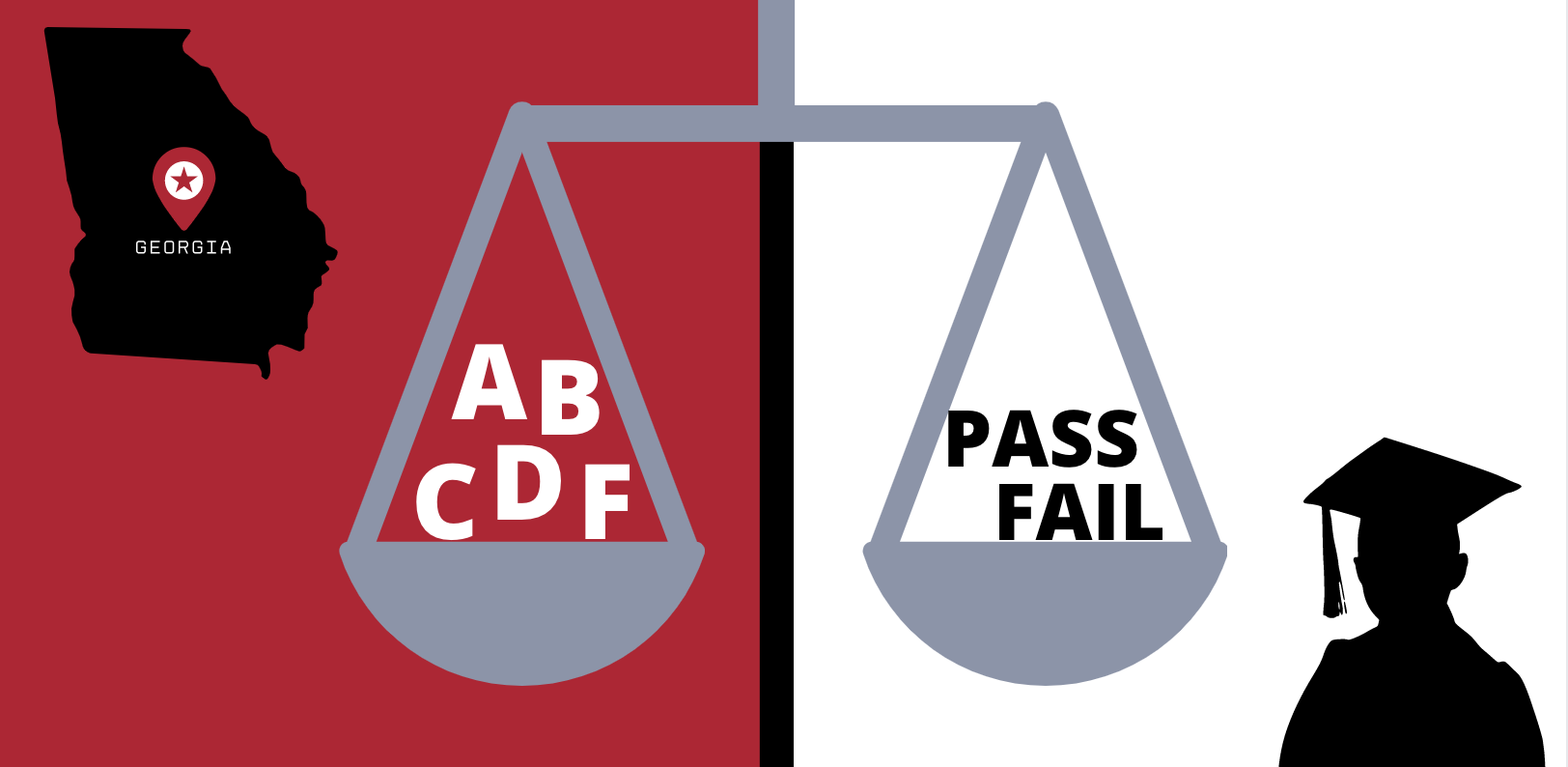The University System of Georgia (USG) has remained unchanged in its decision to not offer a pass/fail option to students following the closure of Georgia colleges due to coronavirus on March 16, 2020, despite pleas and numerous petitions from students across the state.
Georgia public colleges and universities are among the few remaining to not offer an opt-in pass/fail grading system during the coronavirus pandemic.
Every other state in the U.S. has at least one public university with a pass/fail system in place. Further, every one of UGA’s comparable peer institutions and aspirational peer institutions has a pass/fail grading system available.
Why It’s Newsworthy: The University System of Georgia is not offering a pass/fail grading option for college students. With all classes moved online due to COVID-19, students are petitioning to have this option, citing that some are in new situations with more limited access to academic resources.
(Graphic/Cameren Rogers)
An opt-in pass/fail system would give students the option to change their grading system from the traditional A-F grading scale to a pass/fail grading scale on a class-by-class basis. Many universities have implemented this opt-in system temporarily for the spring 2020 semester, such as Ohio State University and North Carolina State University, which are two of UGA’s identified comparable peer institutions. Both institutions have stated that pass/fail grades will not impact students’ GPAs.
The argument against having a pass/fail system is that it can deteriorate the academic rigor of an institution, and that a simple “pass” will not hold as much weight as an actual letter grade. Graduate schools and employers may not be as impressed with a student who elected to pass/fail a class than with a student who took a letter grade, no matter the circumstances.
In April, the USG Board of Regents released a public statement about their decision, saying—in part:
“In times of adversity, we should reach higher, not lower. Maintaining high academic standards is critical to the success of USG students now and in the future. Continuing letter grading for the final few weeks of the semester will allow faculty to assess the performance of students in the same manner as they always have. The USG is confident that faculty and students will rely on the resilience they have shown thus far and continue to meet our high standards.”
Olivia Richardson, a sophomore cognitive science and psychology major at the University of Georgia from Atlanta, Georgia, started the first opt-in pass/fail grading petition at the University of Georgia. The petition has over 10,000 signatures as of Friday, April 24, 2020.
“I don’t think anyone should be penalized for a situation they can’t control,” Richardson said about her motivation to start the petition. “Even if it doesn’t come to fruition, to give that person a voice who can’t speak up for themselves…I wanted to do that.”
Many other Georgia colleges have their own petitions, including Georgia State University, Georgia Southern University, Valdosta State University and Georgia Tech. The first petitions were started in March. The spring semester ended on April 28, 2020.
A Collaborative Solution
In addition to their petitions as individual institutions, students from all 26 colleges and universities represented by the USG also support USG Students 4 Grade Reform (USGS4GR), a coalition of students from across the state who are advocating for grade reform on the basis of fairness for their peers.
USGS4GR has started their own petition with the option for signees to tell stories of their experiences with the transition to online learning. As of April 21, 2020, the organization has collected over 2,500 individual stories from students across Georgia who are struggling with their coursework.
The organization posted a video on Twitter on April 20, 2020, of members calling out the USG Board of Regents. The video now has over 48,000 views and 1,000 likes.
Actress and activist Alyssa Milano retweeted the video with the comment: “Besides Arizona St., the University System of Georgia’s 26 schools are the only ones in the country to not change their grading system in recognition of the COVID-19 pandemic. Help fight for USG grade reform by going to http://usgs4gr.org and following the action steps there[.]”
https://twitter.com/gradereform4usg/status/1252276807220461574
Ciera Thomas, a sophomore microbiology major at UGA from Augusta, Georgia, is an organizer for USGS4GR.
Thomas also serves as a senator for UGA’s Student Government Association, where she authored Resolution 32-16, which called for the introduction of an opt-in pass/fail system. The resolution passed and was signed by former SGA President Rachel Byers.
To me, it’s not a matter of politics; it’s a matter of ethics and a matter of equity,” Thomas said.
“I think that not changing the grading scale when we have changed our manner of delivering instruction puts a significant number of students from various socioeconomic backgrounds and from different geographic locations at a significant disadvantage,” Thomas said.
The Resource Factor
Being on a college campus provides many services for students, from food and housing to internet access and library books. Having equal access to resources helps level the playing field for students on an academic level and provides a learning environment equipped with tools to help them succeed.
With many students returning home due to campus closures, “home” can have a lot of different meanings—limited access to Wi-Fi to complete assignments, having to get a job because a parent lost theirs, taking care of a sick family member or living in a different timezone and having to attend lectures at all times of the day.
“Nobody should have to come forward and give out the details of their life… but I think it’s worth noting that these are the realities of so many of our students. And to think that nobody in our university system has a mental health issue that’s affecting their coursework or has a situation at home that’s affecting it or has to break a shelter-in-place mandate to get anything done… you can’t say that’s not true,” Richardson said.
Many professors understand that some students are facing difficult situations and have tried to reduce the work they give to students.
Harrison Frye, an assistant professor of political science at UGA, acknowledges the argument in favor of an opt-in pass/fail system based on what he sees as an instructor.
“A more serious concern is that because of these unprecedented circumstances, there are students who are just unable to have the time to do the work that they might have under normal circumstances and to do the best that they could do,” Frye said. “I know I have students who are taking full-time jobs… just to help with their family situation, and they need the money because of what’s going on. And as a result, they can’t do what they normally would be able to do in the classroom. I think for all sorts of reasons we should look seriously at a pass/fail option.”
In terms of feasibility, Frye suggests students keep in mind that anything is possible—after all, the Board of Regents did reverse the decision on holding in-person classes at UGA in a matter of hours.
Student Voices
Warren Walker, a senior math and risk management/insurance major at UGA from Juliette, Georgia, was a bus driver for UGA Campus Transit before the coronavirus outbreak. He left for spring break with a job and returned from spring break without one, with little relief from his former employer: the university.
“The way that transit works is that during breaks like spring break, students can’t work. So, I was already planning on coming back and working the rest of the semester, but now I don’t have any income from that,” Walker said.
The university announced on March 25, 2020, that non-essential university employees who could not work remotely would receive non-closure emergency paid leave, but this announcement did not cover temporary workers or student workers like Walker.
“I feel like student workers are such a huge part of the university’s workforce, but then again I also see from their perspective how it’s, I guess, a huge financial burden for them… but it’s also really frustrating because
I’m not getting the stimulus check, I don’t have a job, and I can’t get any sort of relief through the university except through the emergency fund,” Walker said.
The UGA Student Emergency Fund, set up by UGA President Jere Morehead, provides “…limited, one-time financial assistance to enrolled students who are unable to meet immediate, essential expenses because of temporary hardship related to an emergency situation, such as an accident, illness, death of a family member, natural disaster, or other unforeseen circumstance.”
Since the onset of coronavirus, the university has added $600,000 to the fund to help students with coronavirus-related financial stress. According to an email from Rebecca Beeler, a media communications representative for UGA, the university has seen an increase in the number of emergency fund applications since campus closure due to the outbreak.
However, more applications may mean less money per individual applicant.
“I applied for relief from the emergency fund, but I only got, like, $200, so I’m gonna have to rely on my parents to help pay my bills until I start my full-time job, which got pushed from July into the fall,” Walker said.
He added some of his friends who do not have as much support from their parents applied to the emergency fund and received enough aid to help them through the rest of the semester.
Walker and other student workers have also been encouraged by the university to file for unemployment.
He’s chosen to stay in Athens rather than return to his home in Juliette, Georgia, located about 23 miles outside of Macon.
Walker said that in high school, he had to drive to fast food restaurants in nearby towns to use the free Wi-Fi for his homework. The Wi-Fi in his hometown of Juliette is not reliable enough to complete schoolwork.
Even though he said his workload hasn’t dramatically increased, he thinks the USG’s decision to not provide students with a pass/fail option is unfair. He called the university’s statement “hollow reasoning,” especially since the nation’s top institutions are allowing a pass/fail system for the spring 2020 semester.
“I kind of got it when it was only a couple of universities had switched over to the pass/fail system, but considering we’re pretty much the only university system holding out from offering students this opportunity, I think it’s kind of showing that they’re not really listening to students’ concerns and that they’re not responding to the needs of students in this crisis,” Walker said.
Emma Strauss, a senior genetics major at UGA from Rockville, Maryland, is also staying in Athens, despite the fact that she temporarily lost her job as a server at Five Bar in downtown Athens.
Her managers helped her apply for unemployment after the restaurant closed, but she said the process took over two hours and included a lot of information that she wasn’t sure how to answer.
“I ended up getting back a letter from the Georgia Department of Labor, and they said that my weekly benefit would be zero dollars… they broke [the pay period] up into four quarters, and for two of the quarters I actually didn’t even have a job. So from their standpoint, I guess it looked like I wasn’t making enough to be considered for unemployment benefits,” Strauss said.
Strauss had to send an email to the department to have her base pay period changed so that she could receive unemployment. The last she heard from them was on April 1, 2020.
“When I applied I set up direct deposit so that if I did get something, it would just go straight in. I haven’t gotten anything in my bank account, and I also haven’t gotten any documents telling me what my weekly benefit could be,” Strauss said. “It’s just been a pretty frustrating process, and I’m trying to be understanding because I know they’re going through millions of applications.”
Strauss decided to stay in Athens until classes end because she did not want to deal with the frustrations of packing her things and moving back to Maryland.
She said she doesn’t feel that her professors are understanding of how stressful the situation is, and most of her classes have not eased their workloads after moving online.
“Most [classes] are just as hard, if not more difficult. It obviously makes the time like this a lot more anxiety-inducing when you have school on top of what you’re already feeling… In the next two weeks, I have four exams, a quiz, a debate and a paper. I feel like that’s a lot for two weeks,” Strauss said.
Strauss said implementing a pass/fail option would likely take a lot of pressure off of students, but given the option, she would keep letter grades on her transcript. She plans to apply to physician assistant school in the coming years.
“I know that some people who were working so hard at the beginning of the semester might and through now might want to keep their letter grades, but others who are struggling even more during this time… it would be nice for them to not have to stress so hard for school,” Strauss said.
Potential Consequences
Not allowing a pass/fail system could have consequences for some Georgia students.
Ciera Thomas said evidence of inequity is mounting, showing why a pass/fail grading option is necessary for many students. She doesn’t understand why the Board of Regents is holding out.
“It’s really hard for me to speak to why the Regents have chosen to remain strong in their current conviction. The statement they put out encourages students to rise to the challenge and reach higher, and… that doesn’t make any sense to me because students at Harvard and at Columbia and at various Ivy Leagues and many of our peer institutions, like the University of Florida and UNC Chapel Hill, all transitioned. It is beyond me,” Thomas said.
Olivia Richardson said she thinks there will be repercussions for USG’s decision. She said multiple people have sent in stories to the organization saying they’re considering transferring out of their USG schools.
“Retention rates might go down. There are students who are not going to commit to a USG school after seeing the effects of this and seeing that they haven’t cared… I know a lot of people would be apprehensive and have been apprehensive to pay a deposit for a USG school after seeing that they haven’t stepped up and tried to help students who might need that,” Richardson said.
Students may not return to classes for the fall and may not even be able to graduate, said Richardson, because they won’t be able to sustain the hit to their grades and may lose a scholarship.
USGS4GR posted the story of an international student from Georgia Tech who had to buy an overpriced flight to get home, shared the plane with someone who later tested positive for coronavirus and attempted to do schoolwork with 1mbps worth of internet. Read his story below.
https://www.facebook.com/permalink.php?story_fbid=115473693461047&id=103790634629353
What It Will Take
With dwindling days until final grades are entered, the USGS4GR cause is running out of time.
According to Thomas, the only way this reform will happen is with active support. She suggests calling Gov. Brian Kemp, calling the Board of Regents, sharing stories and graphics on social media and continuing to be outspoken about the cause.
Thomas thinks the more attention this gets, the more pressure the USG will feel to implement the policy. USGS4GR encourages students to sign the petitions to show their support, and reach out to the organization if they have any questions.
“The most impactful part of all of this for me is realizing how much of a voice and how much of a difference students can make when we band together. I think the power of the collective student voice is incredible, and there is a lot we can do when we work on our own, but when we band together and work together for what we believe in, I think that’s so powerful,” Thomas said.
Other USG professors, the Georgia Department of Education and the USG Board of Regents were contacted for comment but did not return interview requests by the time of publication.
Cameren Rogers is a fourth-year majoring in political science and journalism with a minor in anthropology at the University of Georgia.








Show Comments (1)
Dimo Karamazov
Thank you, that was quite informative.